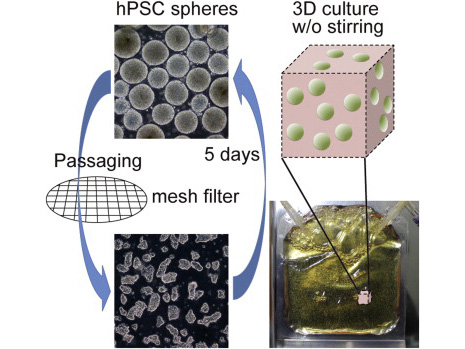日本研发出大量培养高质量干细胞新法
来源:《Cell》
作者:Tomomi G. Otsuji
时间:2014-05-06

诱导多功能干细胞( iPS 细胞)能发育成多种细胞和组织,在再生医疗领域有广阔应用前景,但却面临难以大量生产和培养成本高等难题。日本京都大学的研究小组开发出一种新方法,有望实现批量生产。
研究人员曾发现,利用培养皿增殖 iPS 细胞时,每个培养皿中新生的 iPS 细胞数量很有限。如果在底部很深的容器中加入培养液,该细胞又会沉到容器底部,也很难增殖。假如为了不让细胞下沉而搅拌培养液,又会损伤细胞。此外,这种细胞的团块变大后,营养物质还可能无法到达其内部,也会导致细胞死亡。
京都大学专家领导的研究小组在新一期美国科学期刊《干细胞报告》网络版上报告说,他们在着手解决上述问题时发现,如果将食品添加剂中作为增稠剂使用的“结冷胶”加入培养液, iPS 细胞就不会下沉。假如再同时使用另一种名为“甲基纤维素”的食品添加剂,则能使长大的细胞团块间出现缝隙,不易粘在一起。这样, iPS 细胞就不会因其细胞团块内部缺乏营养而死亡。这两个问题的解决不但有助提高细胞培养效率,还降低了培养成本。
测试结果显示,在装有 200 毫升培养液的容器中,能够获得相当于 20 个直径 10 厘米的培养皿所获得的 iPS 细胞。这些干细胞的质量非常高,拥有发育为其他细胞的能力。此外,研究小组还确认,利用这种方法培育胚胎干细胞也能取得类似的积极效果。
研究小组指出,如果采用上述方法并增大容器、增加培养液,就有望实现 iPS 细胞的批量生产。因此,他们准备与企业合作,在 3 年内开发出利用大型容器培养 iPS 细胞的技术。(引自:生物谷360)
A 3D Sphere Culture System Containing Functional Polymers for Large-Scale Human Pluripotent Stem Cell Production
Abstract Utilizing human pluripotent stem cells (hPSCs) in cell-based therapy and drug discovery requires large-scale cell production. However, scaling up conventional adherent cultures presents challenges of maintaining a uniform high quality at low cost. In this regard, suspension cultures are a viable alternative, because they are scalable and do not require adhesion surfaces. 3D culture systems such as bioreactors can be exploited for large-scale production. However, the limitations of current suspension culture methods include spontaneous fusion between cell aggregates and suboptimal passaging methods by dissociation and reaggregation. 3D culture systems that dynamically stir carrier beads or cell aggregates should be refined to reduce shearing forces that damage hPSCs. Here, we report a simple 3D sphere culture system that incorporates mechanical passaging and functional polymers. This setup resolves major problems associated with suspension culture methods and dynamic stirring systems and may be optimal for applications involving large-scale hPSC production.
原文链接: http://www.cell.com/stem-cell-reports/pdf/S2213-6711(14)00091-5.pdf




